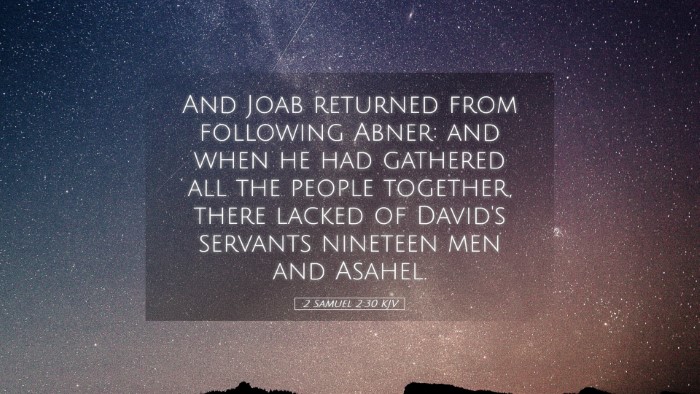Commentary on 2 Samuel 2:30
Bible Verse: "And David sent, and took the bones of Saul and the bones of Jonathan his son from the men of Jabesh-gilead, which had stolen them from the street of Beth-shan, where the Philistines had hanged them: and he brought up from thence the bones of Saul and the bones of Jonathan his son; and they gathered the bones of them that were hanged."
Introduction
The passage from 2 Samuel 2:30 reveals an emotionally charged moment in the narrative of David's kingship, illustrating themes of honor, redemption, and respect for the dead. This commentary aims to explore these themes through the insights of historical Biblical commentaries, integrating perspectives from Matthew Henry, Albert Barnes, and Adam Clarke.
Contextual Overview
The context of 2 Samuel 2:30 comes at a pivotal time in the history of Israel. Following the death of Saul and Jonathan, David has been anointed king over Judah, while the rest of Israel remains under the rule of Saul's son Ishbosheth. The events surrounding Saul’s death and the subsequent treatment of his remains provide significant insights into the cultural and religious values of the time.
Insights from Commentators
Matthew Henry's Perspective
Matthew Henry emphasizes the importance of respect for the dead, particularly for leaders who have fallen. He notes that David's actions reflect a significant consideration for the legacy of Saul and Jonathan, portraying David as a man of principle who honors those who have been unceremoniously dealt with in death. Henry points out that fetching the bones from Jabesh-gilead was both a humanitarian act and a political statement, uniting the nation in memory of their fallen king and his son.
Albert Barnes' Analysis
Albert Barnes expounds upon the implications of the actions taken by David. He highlights that the men of Jabesh-gilead, who took care of Saul's corpse, demonstrated loyalty and bravery—a commendable act of valor that preserved the dignity of their former king. Barnes discusses the significance of placing the bodies of Saul and Jonathan back in their ancestral territory, which not only honors them but also seeks to reunite the divided nation under David's new rule. This act can be seen as a pivotal moment in solidifying David's reign, unifying those who admired Saul alongside those who followed David.
Adam Clarke's Commentary
Adam Clarke provides additional cultural insights, exploring the practices surrounding burial and the treatment of the dead in ancient Israel. He explains that hanging bodies was a punishment meant to disgrace, and David’s retrieval of Saul and Jonathan's remains was an act of rectification against such humiliation. Clarke helps his readers understand the theological implications of honoring the deceased in the Jewish tradition and suggests that David’s actions were an appeal to God for favor and blessing on his reign, showing that he respects God’s anointed, even in death.
Theological Reflections
This verse, and the surrounding narrative, invite deeper theological reflection on leadership and legacy. David's act can be viewed as an analogy for restoring dignity and honor to those who have been disrespected, highlighting God's commitment to justice and reverence for life, even after death.
- Honor in Leadership: David’s respect for Saul and Jonathan signifies a higher calling for leaders, emphasizing that true leadership involves humility and respect for those who came before.
- Communal Mourning and Memory: The act of retrieving the bones serves as a communal remembrance, reinforcing the notion that history, even painful, is to be honored and learned from.
- Divine Providence: David's actions underscore the belief that God guides the affairs of nations and honors those who honor Him—an enduring theme throughout Scripture.
Practical Applications
The relevance of 2 Samuel 2:30 extends beyond its historical context into practical applications for contemporary faith communities. Pastors and theologians can draw from this text in several ways:
- Encouraging Remembrance: Churches might engage in practices that honor past leaders and members, fostering a sense of community and continuity.
- Leading with Integrity: Leaders are reminded to act with integrity and respect toward those they lead, regardless of past conflicts or divisions.
- Emphasizing Redemption: The narrative of redeeming the remains can be paralleled in discussions about God's power to redeem all aspects of history, pointing to hope for all believers.
Conclusion
2 Samuel 2:30 serves as a poignant reminder of the values of dignity, respect, and the importance of memory within the community of faith. By reflecting on the insights gathered from esteemed biblical commentators, we see that this verse transcends its immediate narrative, inviting deeper theological contemplation and practical application that resonates with leaders, scholars, and believers alike.


